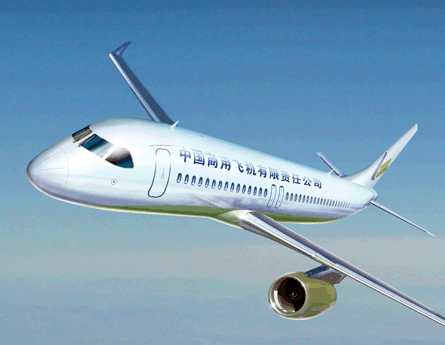Commercial Aircraft Corporation of China's (Comac) unveiling of the concept for its C919 jetliner in September was more than a bold statement of the country's ambition to rival Airbus and Boeing, starting with their A320 and 737 families. It was also a statement of China's technological limitations in achieving that goal independently.
China Aviation Industry (AVIC) - also state-owned and a key Comac supplier - wanted to provide engines, but concedes that no Chinese powerplant will be ready for service in 2016. And, as Comac selects main system suppliers, it will be looking to Western companies that partner Chinese firms to help China to develop new technologies, including composite technologies, says chief programme designer Wu Guanghui.
Clearly, if the C919 and other Chinese aircraft are to succeed in developed markets, Chinese suppliers must close the technology gap with their Western rivals. Partnering arrangements are one approach; another is acquisition.
 |
|---|
AVIC made another bold statement this month with a move by its Xian Aircraft division to buy 91.25% of Austria's Fischer Advanced Composite Components (FACC) - a €265 million ($393 million) turnover company supplying customers including Airbus, Boeing, Bombardier, Embraer and Gulfstream. In a separate development, AVIC General Aircraft saysit wants to buy a general aviation aircraft in the West that can fast-track its development.
Last year it bid unsuccessfully for Germany's Grob Aerospace and it has looked at US manufacturer Piper Aircraft.
AVIC is clearly serious. In 2007 it bid unsuccessfully for the six Airbus factories - spread across France, Germany and the UK - that the European aircraft-maker was looking to sell as part of its Power8 restructuring. AVIC was bumped off the list early on, as the politics at the time dictated that the factories be sold to European companies.
But with its successful move on FACC, AVIC appears to have achieved a good strategic fit in Europe. FACC works for leading airframers, making, for example, Airbus A320 winglets (in partnership with Aviation Partners), A380 fairings and crossbeam floor struts, Boeing 787 spoilers and articulated cove panels for 747-8 wings.
FACC is familiar to AVIC because the Austrian company designs and produces the cabin of the Comac ARJ21 regional jet, to which AVIC is the main supplier.
FACC is already helping the Abu Dhabi government's investment company Mubadala to establish a factory in the emirate that will make composite parts. FACC says it will transfer some Airbus work to the Abu Dhabi factory to "strengthen its competitiveness by setting its footprint in the Middle East" and move some manufacturing outside the eurozone, to spread its currency risk.
China's acquisition trail
|
Xian says it is committed to maintaining FACC operations in Austria, but it is only logical that some of FACC's work will in future be done in China. The country's leadership understands that future aircraft will increasingly make use of composites.
Buying a company such as FACC also allows AVIC to become more firmly entrenched in the global supply chain - one of AVIC's major public goals.
Meeting Western certification standards is another issue. AVIC knows it would struggle on its own to develop a general aviation aircraft to meet Western certification, but through companies such as FACC it can buy a team in the West with experience of dealing with Western regulators.
The acquisition route would also give AVIC General Aircraft an established brand name, customer base, support network and sales and distribution channels.
But as AVIC's failure to acquire the Airbus factories shows, the major hurdle China faces in fast-tracking its development through overseas acquisitions is overcoming objections from Western governments fearful of letting companies of strategic importance come under foreign control.
Source: Flight International























